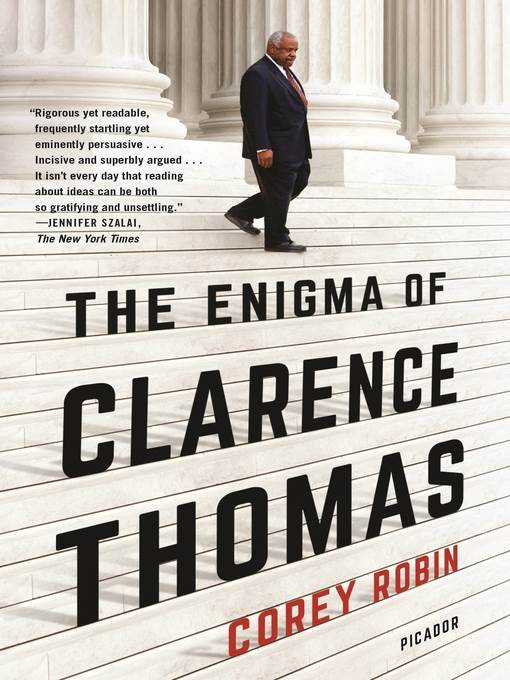
The Enigma of Clarence Thomas
- اطلاعات
- نقد و بررسی
- دیدگاه کاربران
نقد و بررسی

July 22, 2019
Robin (The Reactionary Mind: Conservatism from Edmund Burke to Donald Trump), a political science teacher at CUNY, offers a radical reinterpretation of Supreme Court Justice Clarence Thomas’s jurisprudence, contending that Thomas is first and foremost a kind of conservative black nationalist. He argues that Thomas’s opinions are driven not by a coherent theory of constitutional law but by personal experience, particularly his upbringing: Robin recounts that Thomas, deserted by his father, was raised by his successful and idealized capitalist grandfather, who felt making money was the salvation of black America and was therefore pro-deregulation. Robin deconstructs Thomas’s decisions on high-profile issues including racial discrimination, voting rights, the Second Amendment, and campaign finance, concluding that, for example, Thomas considers affirmative action a tool of elite Americans to protect their privilege and stigmatize African-Americans, and that it is imperative that the Second Amendment extend to personal gun ownership because historically arms were necessary for the protection of black citizens in a racist and hostile society. Robin credibly mines Thomas’s speeches, opinions, and writings in support of his thesis, but the weight he gives to Thomas’s formative experiences feels overstated, and his conclusions are simultaneously too speculative and too pat to sway skeptics. Nonetheless, this novel view of the often-inscrutable Thomas will give court watchers food for thought.

August 1, 2019
For Supreme Court Justice Clarence Thomas, racism in America can never be expunged. Analyzing speeches, court opinions, and Thomas' writings, Robin (Political Science/Brooklyn Coll. and CUNY Graduate Center; The Reactionary Mind: Conservatism From Edmund Burke to Donald Trump, 2017, etc.) argues persuasively that Thomas' right-wing conservatism and black nationalism make him "the most extreme justice on the Supreme Court." Thomas, writes the author, believes "that racism is permanent, the state is ineffective, and politics is feeble." Noting that he rejects "virtually all of Thomas's views," Robin warns against dismissing them, and he presents them in detail along with critiques from other justices and analysts. Central to Thomas' beliefs is the valorization of the black male provider and protector, "a figure of authority whose word is law for the women and children under his care." Black men, "stolid, moral, responsible, authoritative, upstanding," are essential to the black community. For Thomas, white racism and liberal politics combine to undermine black interests. Blacks, therefore, "should cease to look to electoral politics as a means of bettering their situation; any involvement in electoral politics will only confirm white power and reinforce black powerlessness." Efforts such as affirmative action, for example, reinforce black powerlessness by failing to treat blacks and whites as equals, defining blacks as "inferior and deficient." When Thomas considers the incarceration rate for blacks and liberals' cry for judicial and prison reform, he counters that "the racist dimensions of the carceral state" actually benefit African Americans: Harsh policing protects black neighborhoods from crime, and stringent punishment fosters law-abiding behavior. Adversity--even slavery and society under Jim Crow--"helps the black community develop its inner virtue and resolve." Acknowledging that we are all trapped "in the same historical moment" as Thomas, Robin asks readers to examine the premises underlying their own social and political views. Thomas' "beliefs are disturbing, even ugly," Robin acknowledges; "his style is brutal. I want to make us sit with that discomfort rather than swat it away." A penetrating profile of the Supreme Court's longest-serving justice.
COPYRIGHT(2019) Kirkus Reviews, ALL RIGHTS RESERVED.




دیدگاه کاربران